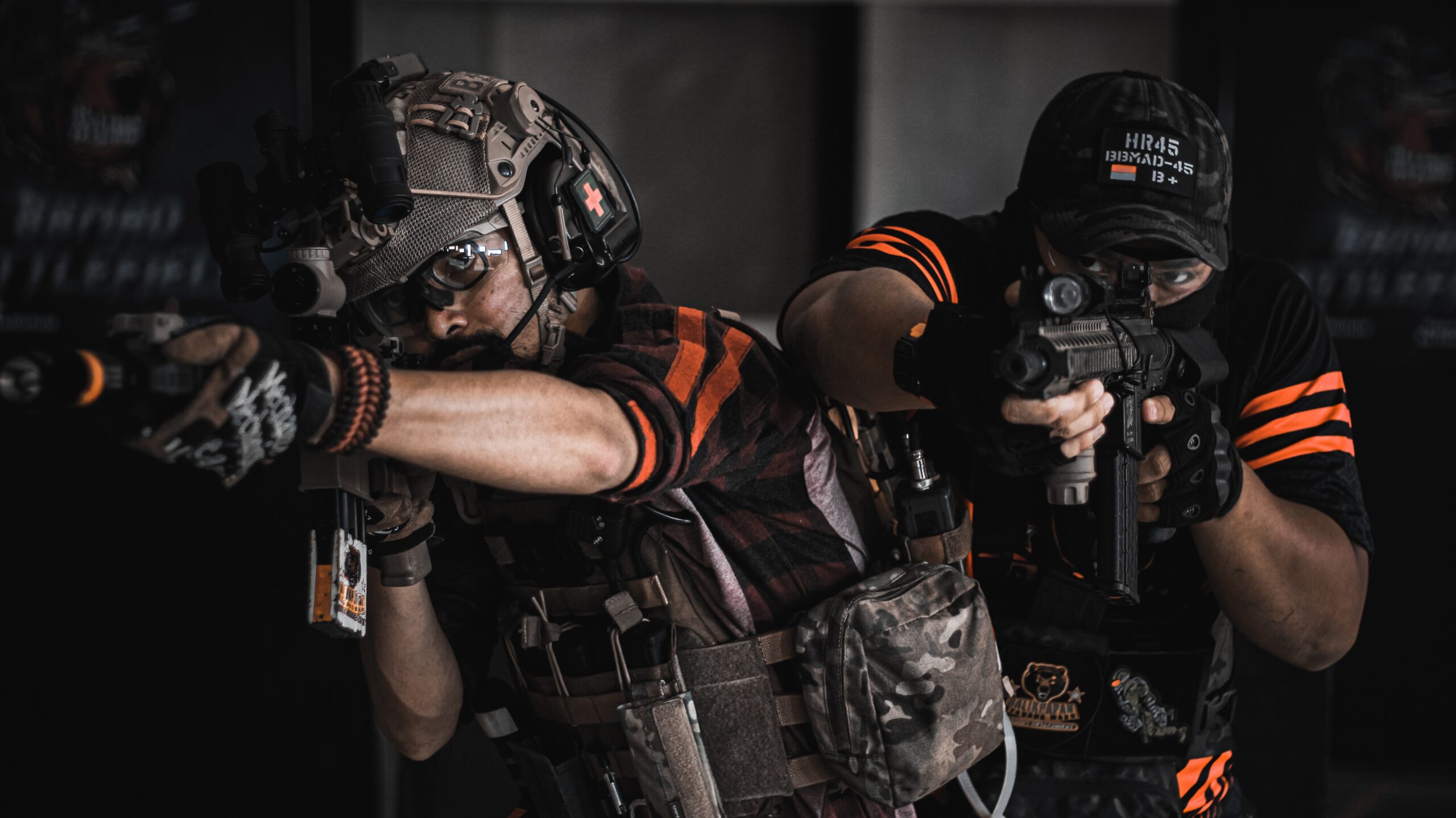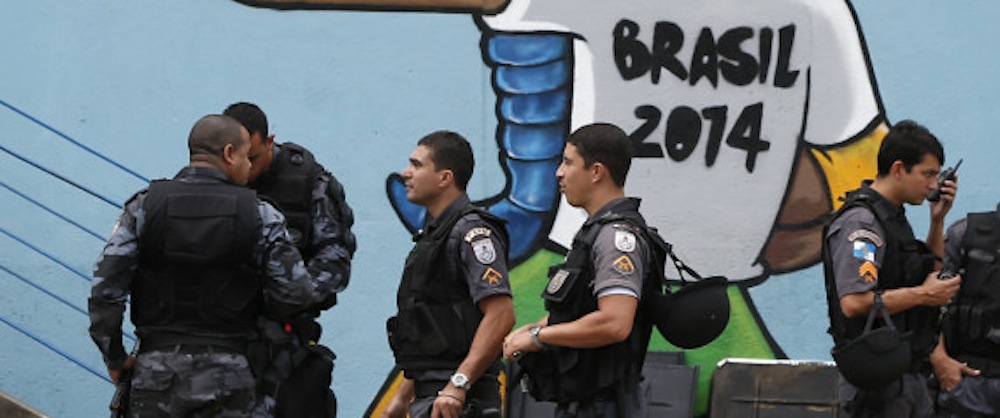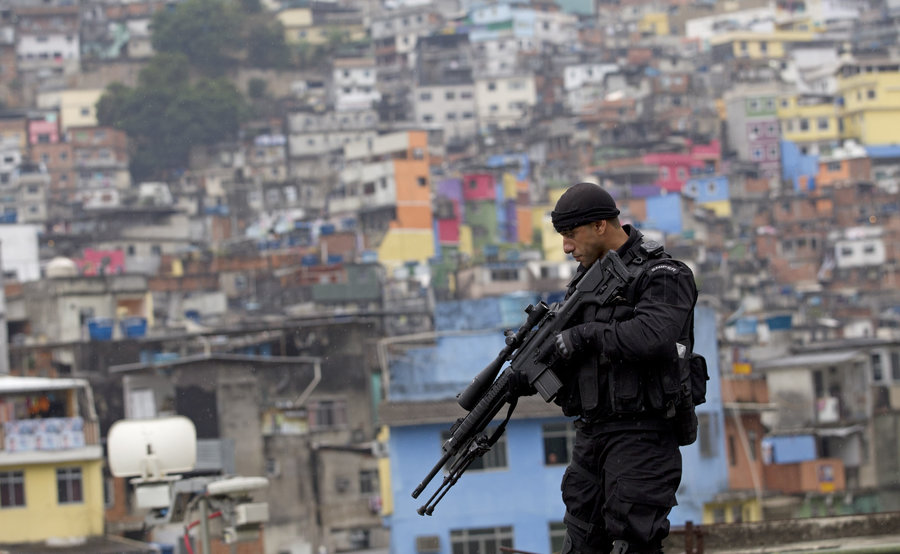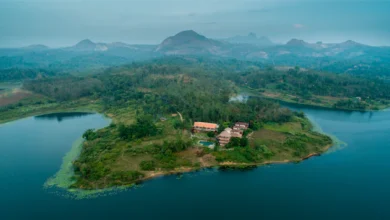
The company formally known as Blackwater is helping provide security training in Brazil in the run up to the 2014 World Cup, stoking fears that the ‘pacification’ of the country’s slums is very much an Iraq-style military occupation.
According to the daily Folha D. S. Paulo, Blackwater, renamed “Xe Services” in 2009 and “Academi” in 2011, has been instructing Brazilian security forces at one of its private training facilities in North Carolina.
In a country that clocks up 50,000 murders a year, securing the $11-13 billion World Cup – the most expensive ever, is of primary importance. Violent anti-government protests erupted across Brazil last year, with demonstrators questioning why billions will be spent hosting the World Cup and the 2016 Rio Olympics rather than on vital public services.

On Monday, Brazil’s coach, Luiz Felipe Scolari, said he was worried that street protests planned during the World Cup could hurt his team’s chances of winning the title. Human rights campaigners have warned that proposed Brazilian anti-terrorism legislation could be used to clamp down on legal protests during the World Cup.
Writing for the Nation, Dave Zirin and Jules Boykoff recently noted how Wikileaks revealed a 2009 cable from the US Embassy in Brasilia, which viewed crises spawned by sports mega-events as an optimal time to cash in.
“After power outages rippled across Brazil in 2009, the US Mission wrote, ‘The newly heightened concerns about Brazil’s infrastructure as a result of this blackout, combined with the need to address infrastructure challenges in the run-up to the 2014 World Cup and 2016 Olympics, present the United States opportunities for engagement on infrastructure development as well critical infrastructure protection and possibly cyber security.’ In short, Brazil’s misery created room for opportunism.
The cable encouraged US government agencies like the Department of Defense and Department of Homeland Security ‘to explore these opportunities in the near-term.’ With Academi’s involvement in Brazil, this type of “opportunity” is taking shape.”
It remains unclear how many of the 170,000 plus security personnel tasked with policing the World Cup have received training from Academi, or the exact dollar amount of the contract, though parallels between anti-insurgency operations in Iraq can already be seen in the pacification of the favelas or slums of Brazil. One April-23 report in the Spanish International news agency EFE notes that a group of 22 military officers and agents from Brazil’s Federal Police “recently received training from US security firm Academi.”
Blackwater gained worldwide notoriety for the substantial role it played in the Iraq war as a contractor for the US government. The firm became infamous for the alleged September-16-2007 shooting deaths of 17 Iraqi civilians in Nisour Square, Baghdad. The attack, which saw 20 others wounded, was allegedly without justification and in violation of deadly-force rules that pertained to American security contractors in Iraq at the time. Between 2005 and September 2007, Blackwater security staff were involved in 195 shooting incidents. In 163 of those cases, Blackwater personnel were found to have fired first.
Pacifying the favelas

On April 5, 2,700 federal army troops occupied Rio de Janeiro’s sprawling Maré complex of favelas, taking over control from a military police contingent previously tasked with securing the area. The security forces will remain there until July 31, after the World Cup concludes. Mare, which covers an area of nearly 10 square kilometers and houses approximately 130,000 people, was effectively under the control of rival drug gangs prior to the operation.
“There are two drug gangs and one militia. So it won’t be in two days, it won’t be in a year, that we bring peace,” Luiz Pezão, the new governor of Rio, said following a meeting with the country’s president, Dilma Rousseff.
Soldiers have established checkpoints at the entrances to the favelas and patrol the streets on foot and in armored personnel carriers. Troops have also employed metal detectors and dogs to search for and sniff out hidden caches of weapons and drugs.
Apart from the deployment of soldiers, 37 “police pacification units” have been created since 2008 to police an area containing some 1.5 million people.
Residents initially welcomed the improvements in security, but fear law enforcement tactics have been heavy-handed. More than two dozen police face charges from a high-profile case in which a suspect died while being tortured by law enforcers. Last Tuesday, the Pavao-Pavaozinho favela erupted in violence after residents blamed police for the murder of Douglas Rafael da Silva Pereira, a 26-year-old professional dancer.
Demonstrators from the favela set barricades of tires ablaze, leading to the closure of streets in the nearby tourist area of Copacabana. Pavao-Pavaozinho is only several hundred yards from where the Olympic swimming events are expected to take place in 2016.
O Globo newspaper, citing local health officials, reported that one resident of the favela was shot and killed during the melee, while another 12-year-old boy was shot and wounded. It remains unknown who fired the shots, and the police did not confirm the reports.
Amnesty International Brazil recently wrote that while the current operation provides the opportunity to show that public security is a right guaranteed to all, it warns that the favelas and outlying areas“shouldn’t be treated as ‘enemy territory’ to be conquered, and the battle against criminal elements shouldn’t lead to the criminalization of the entire community – especially the youth.”
The human rights organization further warns that the empowerment of military forces ill-prepared for policing could spark even greater abuses.
“As the World Cup approaches, there’s a growing fear that this model – intervention by the Army and other security forces in the favelas – could be expanded, raising the threat of human rights violations and the militarization of daily life in the poorest communities. The armed forces have inadequate training for this type of operation, as well as little experience of engaging in dialogue with civil society and communities.”




